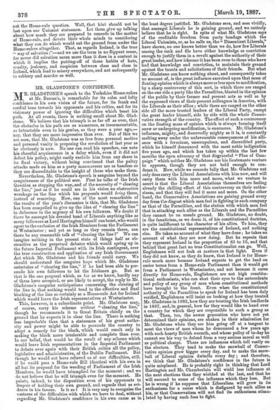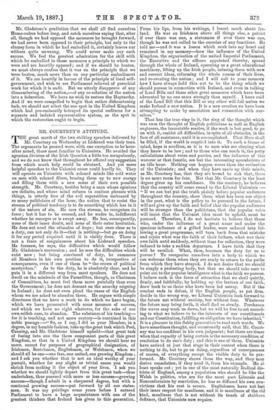MB. GLADSTONE'S CONFIDENCE.
MR. GLADSTONE'S speech to the Yorkshire Home-rulers at Mr. Barran's, is remarkable for its calm and lofty confidence in his own vision of the future, for its frank and cordial tone towards his opponents and his critics, and for its visionary power of ignoring the difficulties which beset his path. At all events, there is nothing small about Mr. Glad- stone. We believe that his triumph is as far off as ever, that the obstacles in his path are as numerous, as insurmountable, as intractable even to his genius, as they were a year ago,— nay, that they are more impressive than ever. But of this we are sure, that Mr. Gladstone was as free from personal motive and personal vanity in proposing the revolution of last year as he obviously is now. No one can read his 'speeches, can note his cheerful acquiescence in a delay which, even if it did not defeat his policy, might easily exclude him from any share in its final victory, without being convinced that the paltry attacks made on him as a party manmuverer are as baseless as they are discreditable to the insight of those who make them.
Nevertheless, Mr. Gladstone's speech is sanguine beyond the sanguineness of the political seer. First he talks of the Irish Question as stopping the way, and of the necessity of "clearing the line," just as if he could see in his vision no obstructive wreckage on the line which his proposals would bring there, instead of removing. Now, one of the most remarkable of the results of the year's discussion is this, that Mr. Gladstone has been compelled to give up the idea of "clearing the line" in deference to the urgency of his own followers. We doubt if there be amongst his devoted band of Liberals anything like as many followers as Lord Hartington himself can boast, who would agree to the exclusion of the Iris' h Members from the Parliament at Westminster ; and yet so long as they remain there can there be any reasonable talk of "clearing the line I" We can imagine nothing in the present state of things half as ob- structive as the perpetual debates which would spring up in the future Imperial Parliament with its Irish contingent, over the true construction and application of any Irish Government Act which Mr. Gladstone and his friends could carry. We should understand the sanguine hope which Mr. Gladstone entertains of "clearing the line," if he had been able to per- suade his own followers to let the Irishmen go. But as that is the one proposal which, so far as we know, hardly any of them have accepted, or are likely to accept, the reply to Mr. Gladstone's sanguine anticipations concerning the clearing of the line is, that nothing would tend to the effective and final blocking of the line so certainly as a Home-rule Act for Ireland which would leave the Irish representatives at Westminster.
This, however, is a subordinate point. Mr. Gladstone may, of course, carry his scheme without "clearing the line," though he recommends it to Great Britain chiefly on the ground that he expects it to clear the line. There is nothing less improbable than that a statesman of his great autho- rity and power might be able to persuade the country to adopt a remedy for the block, which would result only in making the block more intolerable and complete than ever. In our belief, that would be the result of any scheme which would leave Irish representatives in the Imperial Parliament to debate over again with their British critics all the policy, legislative and administrative, of the Dublin Parliament. But though he would not have relieved us of our difficulties, still, if he could pass a Home-rule Bill identical with his own in all but its proposal for the weeding of Parliament of the Irish Members, he would have triumphed for the moment ; and we do not believe that he will triumph even for the moment. He points, indeed, to the disposition even of his opponents to despair of holding their own ground, and regards that as evi- dence in his favour. Is it so It is very easy to recognise the vastness of the difficulties with which we have to deal, without regarding Mr. Gladstone's confidence in his own cause as in
the least degree justified. Mr. Gladstone sees, and sees vividly, that amongst Liberals he is gaining ground, and we entirely believe that he is right. In spite of what Mr. Gladstone says of the creditable freedom from party bondage which the Liberal Unionists, or, as he calls us, the" Dissentient Liberals," have shown, no one knows better than we do, how few Liberals among the rank and file have either knowledge or conviction enough to justify them in a revolt against the authority of their great leader, and how irksome it has been even to those who have had that knowledge and conviction, to maintain their ground against the taunts and solicitations of their friends. But what Mr. Gladstone can know nothing about, and consequently takes no account of, is the great influence exercised upon that mass of floating opinion which is always more or less open to modification, by a sharp controversy of this sort, in which there are ranged on the one side a party like the Parnellites, blasted in the opinion of the public by their former and present acts as well as by the expressed views of their present colleagues in America, with the Liberals as their allies ; while there are ranged on the other side all the more trusted leaders of the Liberal Party, except the great leader himself, side by side with the whole Conser- vative strength of the country. The effect of such a controversy on the floating mass of opinion which is always forming itself anew or undergoing modification, is enormous. Mr. Gladstone's influence, mighty, and deservedly mighty as it is, is constantly melting away under the unfavourable consequences of his alli- ance with a ferocious, unscrupulous, and discredited party, which he himself denounced with the most noble indignation five years ago, and which has taken up within the last few months the open advocacy of that disgraceful "Plan of Cam- paign" which neither Mr. Gladstone nor his lieutenants venture to approve, though they are not bold enough to con- demn it. Now, while we concede fully that Mr. Gladstone not only does carry the Liberal Associations with him now, and will carry them with him more and more, what we venture to assert is that the Liberal Associations themselves are feeling already the chilling effect of this controversy on their enthu- siasm, and that they will feel it more and more. On the other hand, the Conservative Associations are gaining ground every day from the disgust which men feel in fighting in such company as that of the Parnellites, and the elation with which men feel that in attacking such allies as the Liberals and the Parnellites they cannot be on unsafe ground. Mr. Gladstone, no doubt, in the fanaticism, as we deem it, of his constitutional doctrine, is quite indifferent to the character of his allies. To him, they are the constitutional representatives of Ireland, and nothing else. He takes no account of what they have dons; he takes no account of what they are now doing. But he repeats that they represent Ireland in the proportion of 85 to 16, and that behind that great fact no true Constitutionalist can go. Well, Englishmen will not look at matters in that light. Even if they did not know, as they do know, that Ireland is for Home.. rule much more because Ireland expects to get the land on easier terms from a Home-rule Parliament than it would get from a Parliament in Westminster, and not because it cares directly for Home-rule, Englishmen are not high constitu- tional enthusiasts, who can shut their eyes to the antecedents and policy of any group of men whom constitutional methods have brought to the front. Even when the constitutional authority of the Parnellites to speak for Ireland has been duly verified, Englishmen will insist on looking at how they treated Mr. Gladstone in 1882, how they are treating the Irish landlords in 1887, and, in general, how far they would like to hand over a country for which they are responsible to such a group as that. Then, too, the newer generation who have not yet determined their opinions, are shaken in their admiration for Mr. Gladstone when they see him going off at a tangent to meet the views of men whom he denounced a few years ago with such hearty British warmth, and whose policy of to-day he cannot see his way to defend from a very serious moral as well as political charge. These are influences which tell vastly on the electors. They tend to make the snowball of Conser- vative opinion grow bigger every day, and to make the snow- ball of Liberal opinion dwindle every day ; and therefore, we think that Mr. Gladstone's confidence in the future is quite misplaced. He is probably right in thinking that Lord Hartington and Mr. Chamberlain will wield less influence at the next elections than they wielded at the last, and that he will succeed to some of the influence which they lose. Bat he is wrong if he supposes that Liberalism will grow in its enthusiasm for a cause which is disfigured by such allies as his, or that Conservatism will not find its enthusiasm stimu- lated by having such foes to fight.
Mr. Gladstone's prediction that we shall all find ourselves Home-rulers before long, and catch ourselves saying that, after all, though we had opposed the measures he brought forward, we had never been opposed to their principle, but only to the clumsy form in which he had embodied it, certainly leaves our withers quite unwrung. We could never make any such excuse. We feel the greatest admiration for the skill with which he embodied in thew measures a principle to which we were and are heartily opposed ; and if we should be beaten, we must always confess that it was on the principle that we were beaten, much more than on any particular embodiment of it. We are heartily in favour of the principle of local self- government, and wish to see Parliament relieved of parochial work for which it is unfit. But we utterly disapprove of any dismembering of the nation,—of any re-solution of the nation into a federation. We have no wish to restore the Heptarchy. And if we were compelled to begin that rather disheartening task, we should not select the one spot in the United Kingdom which had pre-eminently betrayed its special unfitness for a separate and isolated representative system, as the :spot in which the restoration ought to begin.



































 Previous page
Previous page